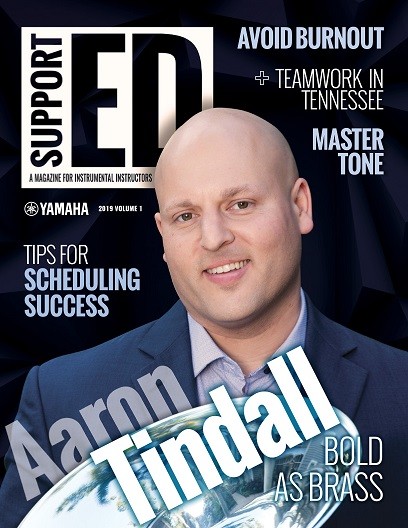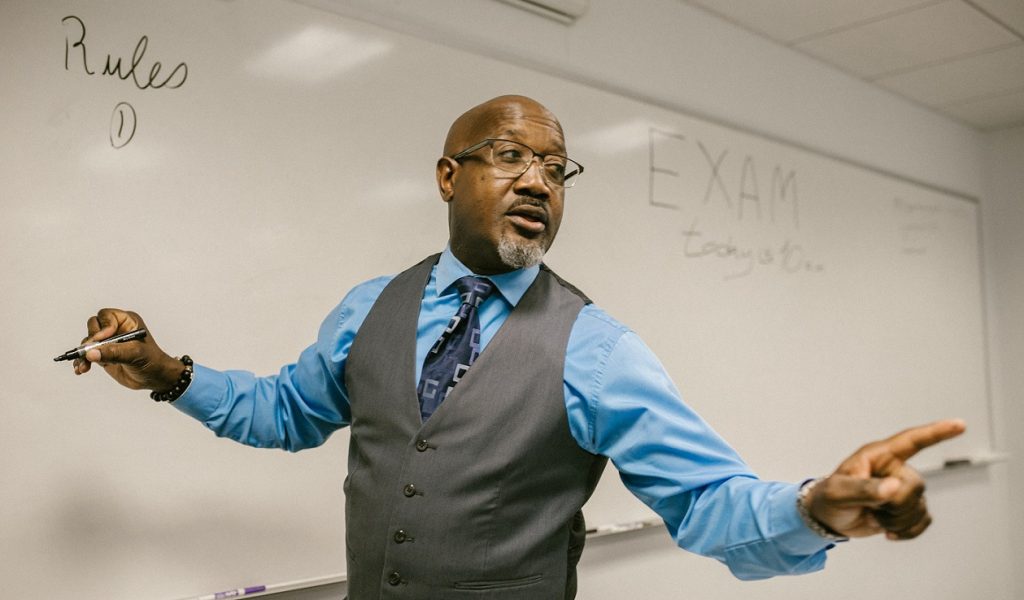Avoid Burnout
When your attitude toward your career wavers, don’t succumb to burnout. Stay inspired and inspiring rather than self-combusting.
You became an instrumental educator because you love music and have a passion for sharing your talent with students. When your job inspires you, teaching may not even feel like work.
But if you notice yourself getting frustrated by your school’s administration, parents and students, or if you’re beginning to question why you devote so much of your free time to the music program, you may be on the verge of burnout.
Keep things fresh to enjoy yourself more and to offer your students your best self.
Have a Positive Network

If your friends and colleagues find fault in everything, you’re more likely to be negative too. Befriend people with a sunnier outlook; it’s better for your mental health.
“You’re the sum of the people you surround yourself with,” says Nolan Jager Loyde, assistant director of fine arts over instrumental music at Round Rock Independent School District in Texas. “Choose your friends wisely. Listen to what they’re saying and choose based on who you want to be.”
When you’re feeling frazzled, a mentor may help you find perspective. Good mentors are supportive, honest, positive and emotionally available, with enough experience and wisdom to make their comments meaningful and relevant.
“If you’re in a small school, and you don’t have other music staff, don’t get into your little hole and not get out of it,” says Richard Sherrick, a retired music educator, choir director and band director from Parkway Local Schools in Rockford, Ohio. “If you’re the only music teacher, you can feel isolated. Reach out to people in other schools in the area.”
Take on New Responsibilities

Rekindle your passion for your work by attending professional conferences, teaching new material or becoming a liaison to the state music educators association. It may inspire you in ways that you couldn’t imagine.
“Where I really see long-term successful careers in music education are with those who continue to evolve their roles, not just within their classrooms but also within their community,” says Scott Lang, a music education advocate based in Chandler, Arizona. “They become mentor teachers [or] take on leadership roles [or] take on roles with a state music association. [They] chair the department [or] host a Facebook group or host a concert festival. That’s typically when I see long-term teachers who are just knocking it out of the park. After they conquer what has happened in the classroom, they try to conquer what happens outside.”
In addition to offering student-centered workshops and presenting at music conferences around the country, Lang has written several books, including “Leader of the Band“ and “Seriously?!: Ruminations, Affirmations, and Observations About the State of Music Education.”
Bring Personality into Your Classroom
Sharing small and appropriate details about yourself can help you bridge the two main parts of your life — the classroom and home — and it can help you connect with your students in a meaningful way. All this can lead to greater on-the-job satisfaction.
“I might say I was with my girlfriend at one of our favorite restaurants having a really comforting meal — that’s the feeling I want to have when you play this song,” says Loyde, who addressed improving work environments and making each day more meaningful at the Music for All Summer Symposium in 2018 and The Midwest Clinic International Band and Orchestra Conference in 2012. “That helps me say, ‘This is my life. My life is here [during] the 13 hours that I’m spending here.’ I find that the teachers who are worn out keep it separate.”
Realize that You May Change
Just because your job was perfect for you 10 or 20 years ago doesn’t make it the right fit now. Some people have trouble realizing that when life circumstances change, it can impact work.
“I wasn’t shy about working 80 or 90 hours a week at [age] 25,” says Lang, who taught in the classroom for 16 years and now spends 200 days on the road annually speaking about topics like teacher burnout.
“I worked weekends, nights, summers. It’s an all-consuming profession, and you’ve got to be better next year,” says Lang. “But I’m 51. I have two kids and a wife, and I don’t want to sleep in the band room. Maybe I might be better off with a different school environment, or a different age range, or different curricula, or different music.”
Find Fulfillment Outside of Work
Make time for activities like going to the gym or doing something else that keeps you physically active. “You need to find a secondary release,” says Sherrick, who occasionally gives seminars about passion for the job and avoiding burnout.
“I encourage some type of non-musical hobby or pastime. I have a friend, and we played racquetball on Tuesdays. Doing [this activity] with a friend made it easier to get out of the house and go,” Sherrick says.
Exploring your passion for music outside of the classroom may also bring you satisfaction. “I played in a little dance band, played in a community orchestra,” Sherrick says. “I tried to keep my playing skills up, and that fulfills you too. You’re socializing with [other] people.”
Look for a New Job
If something insurmountable at work makes you unhappy, search for a new position. “It’s okay to make a lateral move for personal and professional reasons,” Lang says.
“There will always be an opening somewhere. Teachers are making changes on a far more frequent basis than years ago. If they say, ‘I’m struggling here,’ that’s OK. Find a different fit. They feel like they’re trapped, but they’re not. Teachers shouldn’t be shy about using their free agency,” Lang says.
If you’re feeling the onslaught of burnout, your students will see it and suffer for it. Don’t stagnate. Assess your situation, which can lead to rejuvenation for your job or a resolution for a change.
This article originally appeared in the 2019 V1 issue of Yamaha SupportED. To see more back issues, find out about Yamaha resources for music educators, or sign up to be notified when the next issue is available, click here.


















